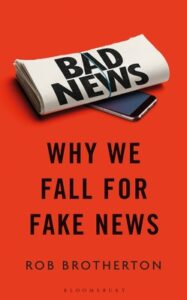 Bad News: Why We Fall for Fake News, Rob Brotherton
Bad News: Why We Fall for Fake News, Rob Brotherton
Bad News is surprisingly full of good news, in fact. Although the subtitle makes it sound like this is all about “fake news”, that’s not quite the truth. The book focuses on the news in general, reasoning that to understand the problem of fake news, you must first understand what the news is and what we hope to get out of it. Fair enough, and Brotherton explains clearly various bits of research around the news and covers the history of how we’ve responded to the news.
The news is generally good, in fact: most people aren’t in filter bubbles, says the research; most people aren’t taken in by fake news, or so it seems in studies; partisan effects are there but less than you’d guess; people are able to take on board new information.
Which leaves me wondering why the online experience is so different, where it’s abundantly clear that people do believe absolutely bonkers things from fringe websites. Are those people not reached by the studies, and thus the studies inherently contain some bias? Is the online community just one of those examples where you only hear the squeaky wheels, and gosh, they squeak loudly? No conclusions here, just wondering.
Brotherton’s book is a surprisingly quick read, and surprisingly optimistic. I actually enjoyed it quite a bit.

Leave a Reply